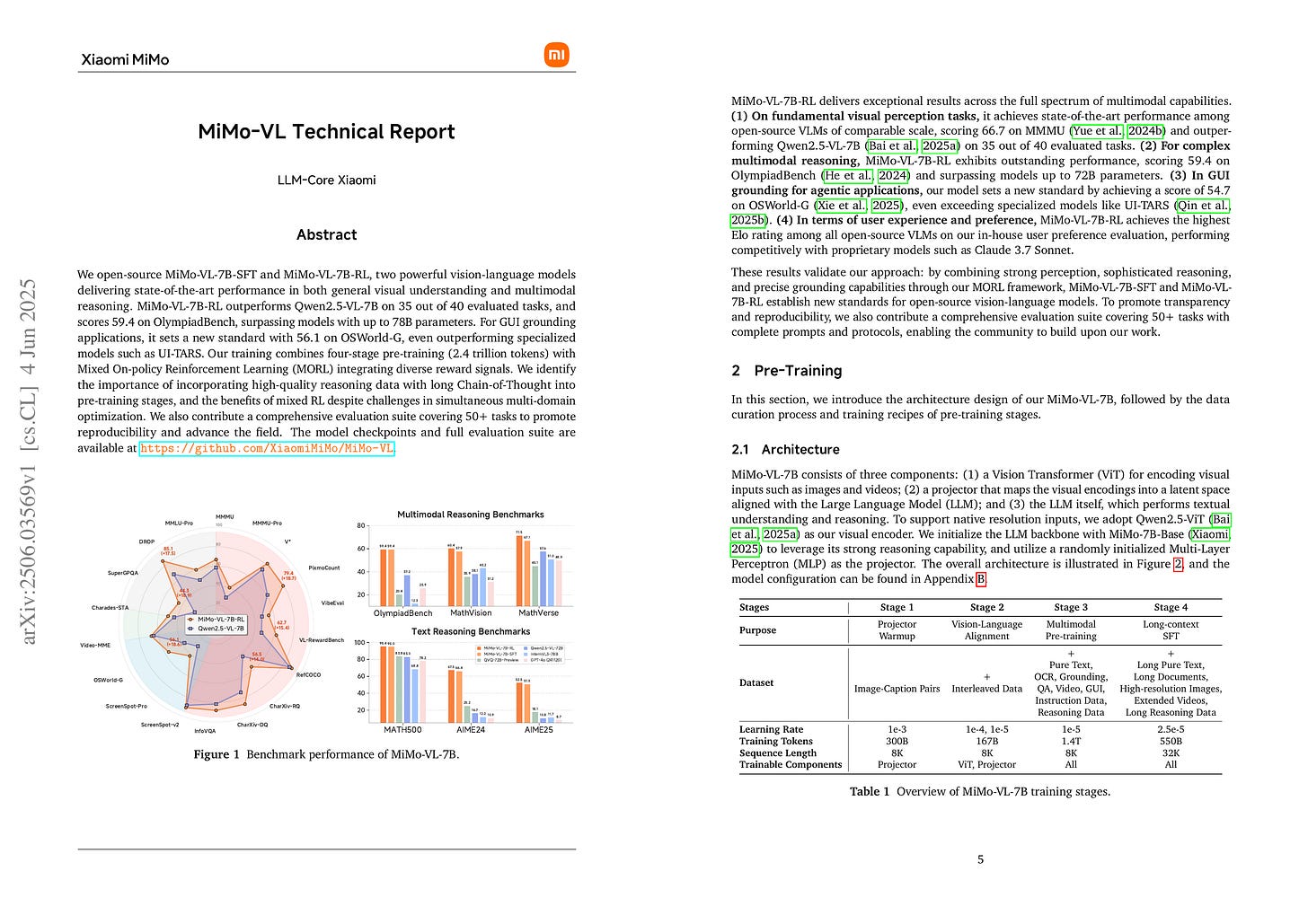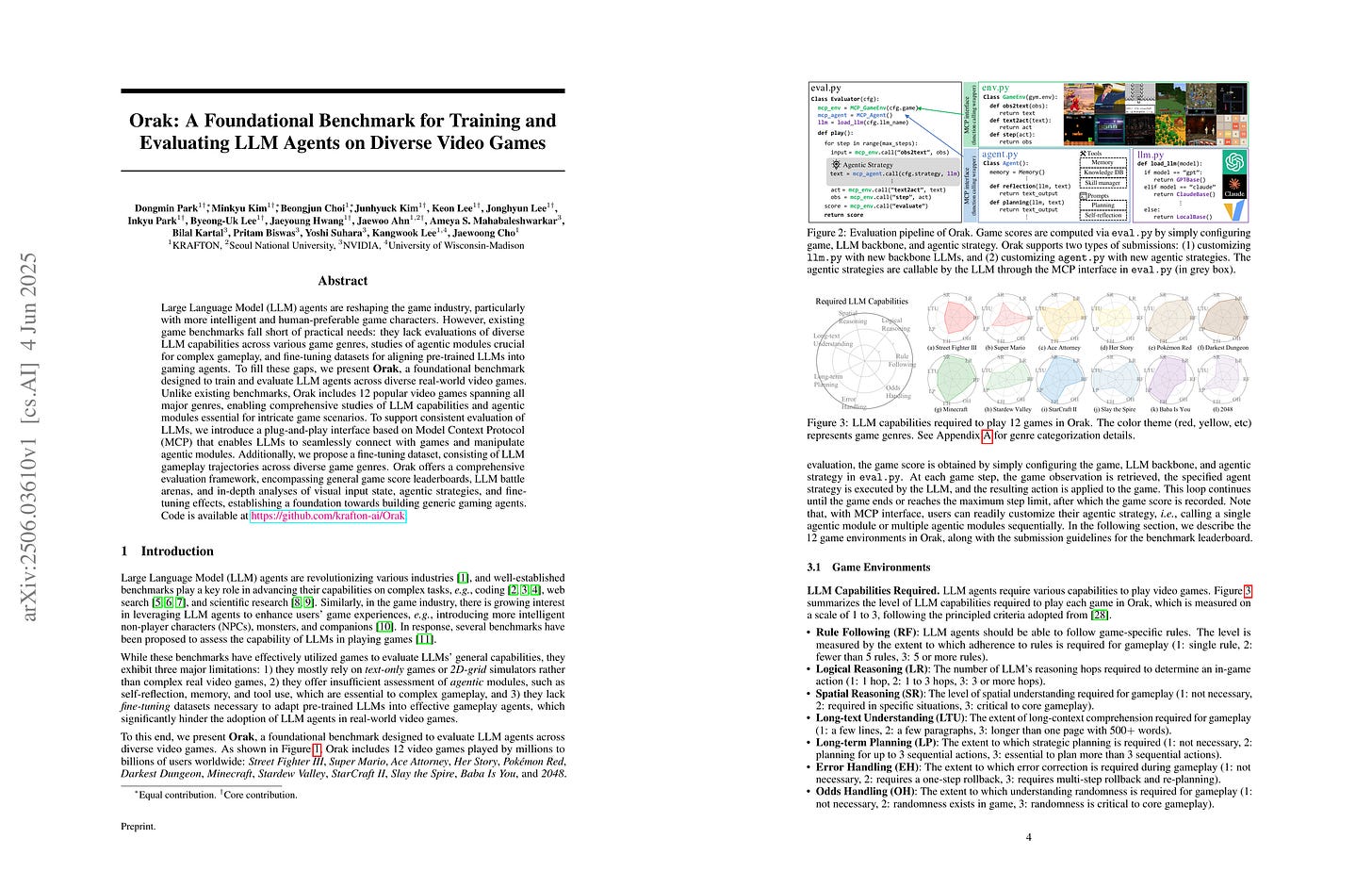2025년 6월 5일
MiMo-VL Technical Report
(LLM-Core Xiaomi)
We open-source MiMo-VL-7B-SFT and MiMo-VL-7B-RL, two powerful vision-language models delivering state-of-the-art performance in both general visual understanding and multimodal reasoning. MiMo-VL-7B-RL outperforms Qwen2.5-VL-7B on 35 out of 40 evaluated tasks, and scores 59.4 on OlympiadBench, surpassing models with up to 78B parameters. For GUI grounding applications, it sets a new standard with 56.1 on OSWorld-G, even outperforming specialized models such as UI-TARS. Our training combines four-stage pre-training (2.4 trillion tokens) with Mixed On-policy Reinforcement Learning (MORL) integrating diverse reward signals. We identify the importance of incorporating high-quality reasoning data with long Chain-of-Thought into pre-training stages, and the benefits of mixed RL despite challenges in simultaneous multi-domain optimization. We also contribute a comprehensive evaluation suite covering 50+ tasks to promote reproducibility and advance the field. The model checkpoints and full evaluation suite are available at https://github.com/XiaomiMiMo/MiMo-VL.
샤오미의 멀티모달 추론 모델. 멀티모달 모델도 이제 2T 이상 학습이 자연스럽네요.
Xiaomi's multimodal reasoning model. It seems that training on more than 2T has become natural for multimodal models now.
#rl #reasoning #multimodal
Why Gradients Rapidly Increase Near the End of Training
(Aaron Defazio)
During long-duration Large Language Model (LLM) training runs the gradient norm increases rapidly near the end of training. In this short note, we show that this increase is due to an unintended interaction between weight decay, normalization layers, and the learning rate schedule. We propose a simple correction that fixes this behavior while also resulting in lower loss values throughout training.
학습 과정의 그래디언트 노름의 증가가 LR 변화에 대해 Weight Decay가 고정되어 있기 때문이라는 분석. 그래서 Weight Decay를 LR에 비례하게 수정했는데 PaLM의 Weight Decay ∝ lr^2와 비슷하군요.
The paper analyzes that the increase in gradient norm during training is due to weight decay being fixed relative to changes in the LR. As a solution, they modified weight decay to be proportional to LR, which is similar to the weight decay ∝ lr^2 approach used in PaLM.
#optimization
StochasTok: Improving Fine-Grained Subword Understanding in LLMs
(Anya Sims, Thom Foster, Klara Kaleb, Tuan-Duy H. Nguyen, Joseph Lee, Jakob N. Foerster, Yee Whye Teh, Cong Lu)
Subword-level understanding is integral to numerous tasks, including understanding multi-digit numbers, spelling mistakes, abbreviations, rhyming, and wordplay. Despite this, current large language models (LLMs) still often struggle with seemingly simple subword-level tasks like How many 'r's in 'strawberry'?. A key factor behind these failures is tokenization which obscures the fine-grained structure of words. Current alternatives, such as character-level and dropout tokenization methods, significantly increase computational costs and provide inconsistent improvements. In this paper we revisit tokenization and introduce StochasTok, a simple, efficient stochastic tokenization scheme that randomly splits tokens during training, allowing LLMs to 'see' their internal structure. Our experiments show that pretraining with StochasTok substantially improves LLMs' downstream performance across multiple subword-level language games, including character counting, substring identification, and math tasks. Furthermore, StochasTok's simplicity allows seamless integration at any stage of the training pipeline; and we demonstrate that post-training with StochasTok can instill improved subword understanding into existing pretrained models, thus avoiding costly pretraining from scratch. These dramatic improvements achieved with a minimal change suggest StochasTok holds exciting potential when applied to larger, more capable models. Code open-sourced at: https://github.com/anyasims/stochastok.
Tokenizer Regularization 계통의 아이디어는 정말 오랜만이네요. strawberry 문제에 집착할 필요가 있는지는 모르겠지만 해소할 수 있다면 나쁘지 않겠죠.
It's been a long time since I've seen an idea related to tokenizer regularization. I'm not sure if we need to be focused on the strawberry problem, but if we can resolve it, that would be a good thing.
#tokenizer #regularization
OpenThoughts: Data Recipes for Reasoning Models
(Etash Guha, Ryan Marten, Sedrick Keh, Negin Raoof, Georgios Smyrnis, Hritik Bansal, Marianna Nezhurina, Jean Mercat, Trung Vu, Zayne Sprague, Ashima Suvarna, Benjamin Feuer, Liangyu Chen, Zaid Khan, Eric Frankel, Sachin Grover, Caroline Choi, Niklas Muennighoff, Shiye Su, Wanjia Zhao, John Yang, Shreyas Pimpalgaonkar, Kartik Sharma, Charlie Cheng-Jie Ji, Yichuan Deng, Sarah Pratt, Vivek Ramanujan, Jon Saad-Falcon, Jeffrey Li, Achal Dave, Alon Albalak, Kushal Arora, Blake Wulfe, Chinmay Hegde, Greg Durrett, Sewoong Oh, Mohit Bansal, Saadia Gabriel, Aditya Grover, Kai-Wei Chang, Vaishaal Shankar, Aaron Gokaslan, Mike A. Merrill, Tatsunori Hashimoto, Yejin Choi, Jenia Jitsev, Reinhard Heckel, Maheswaran Sathiamoorthy, Alexandros G. Dimakis, Ludwig Schmidt)
Reasoning models have made rapid progress on many benchmarks involving math, code, and science. Yet, there are still many open questions about the best training recipes for reasoning since state-of-the-art models often rely on proprietary datasets with little to no public information available. To address this, the goal of the OpenThoughts project is to create open-source datasets for training reasoning models. After initial explorations, our OpenThoughts2-1M dataset led to OpenThinker2-32B, the first model trained on public reasoning data to match DeepSeek-R1-Distill-32B on standard reasoning benchmarks such as AIME and LiveCodeBench. We then improve our dataset further by systematically investigating each step of our data generation pipeline with 1,000+ controlled experiments, which led to OpenThoughts3. Scaling the pipeline to 1.2M examples and using QwQ-32B as teacher yields our OpenThinker3-7B model, which achieves state-of-the-art results: 53% on AIME 2025, 51% on LiveCodeBench 06/24-01/25, and 54% on GPQA Diamond. All of our datasets and models are available on
https://openthoughts.ai
.
추론 학습을 위한 데이터셋. 응답을 샘플링하면서 필터링은 의도적으로 안 했네요.
A dataset for reasoning training. When sampling responses, they intentionally avoided filtering.
#reasoning #synthetic-data
RewardAnything: Generalizable Principle-Following Reward Models
(Zhuohao Yu, Jiali Zeng, Weizheng Gu, Yidong Wang, Jindong Wang, Fandong Meng, Jie Zhou, Yue Zhang, Shikun Zhang, Wei Ye)
Reward Models, essential for guiding Large Language Model optimization, are typically trained on fixed preference datasets, resulting in rigid alignment to single, implicit preference distributions. This prevents adaptation to diverse real-world needs-from conciseness in one task to detailed explanations in another. The standard practice of collecting task-specific preference data and retraining reward models is resource-intensive, often producing biased rewards, and limits practical application. We introduce generalizable, principle-following reward models. We propose that RMs should understand and adhere to dynamically provided natural language specifications of reward principles, similar to instruction-following in LLMs. To measure this capability, we develop RABench, a comprehensive benchmark for RMs focusing on generalization across diverse principles. Evaluations on RABench reveal poor generalization of current RMs. As a solution, we present RewardAnything, a novel RM designed and trained to explicitly follow natural language principles. We achieve SotA performance with RewardAnything in traditional RM benchmark simply by specifying a well-defined principle, and results on RABench show we excel in adapting to novel principles without retraining. Furthermore, RewardAnything integrates seamlessly with existing RLHF methods and we show by a case study on how to automatically and efficiently align LLMs with only natural language principles.
원칙 기반 추론 Reward Model을 위한 벤치마크와 모델을 구축.
Construction of a benchmark and model for principle-based reasoning reward models.
#reward-model #reasoning #rl #synthetic-data
Orak: A Foundational Benchmark for Training and Evaluating LLM Agents on Diverse Video Games
(Dongmin Park, Minkyu Kim, Beongjun Choi, Junhyuck Kim, Keon Lee, Jonghyun Lee, Inkyu Park, Byeong-Uk Lee, Jaeyoung Hwang, Jaewoo Ahn, Ameya S. Mahabaleshwarkar, Bilal Kartal, Pritam Biswas, Yoshi Suhara, Kangwook Lee, Jaewoong Cho)
Large Language Model (LLM) agents are reshaping the game industry, particularly with more intelligent and human-preferable game characters. However, existing game benchmarks fall short of practical needs: they lack evaluations of diverse LLM capabilities across various game genres, studies of agentic modules crucial for complex gameplay, and fine-tuning datasets for aligning pre-trained LLMs into gaming agents. To fill these gaps, we present Orak, a foundational benchmark designed to train and evaluate LLM agents across diverse real-world video games. Unlike existing benchmarks, Orak includes 12 popular video games spanning all major genres, enabling comprehensive studies of LLM capabilities and agentic modules essential for intricate game scenarios. To support consistent evaluation of LLMs, we introduce a plug-and-play interface based on Model Context Protocol (MCP) that enables LLMs to seamlessly connect with games and manipulate agentic modules. Additionally, we propose a fine-tuning dataset, consisting of LLM gameplay trajectories across diverse game genres. Orak offers a comprehensive evaluation framework, encompassing general game score leaderboards, LLM battle arenas, and in-depth analyses of visual input state, agentic strategies, and fine-tuning effects, establishing a foundation towards building generic gaming agents. Code is available at https://github.com/krafton-ai/Orak.
LLM을 위한 게임 벤치마크 수트. MCP 기반이군요. 게임이라는 대상 자체가 LLM을 위해 좋은 환경이 될 수 있지 않을까요.
Game benchmark suite for LLMs. It's based on MCP. I think games could be an excellent environment for LLMs.
#benchmark
Act Only When It Pays: Efficient Reinforcement Learning for LLM Reasoning via Selective Rollouts
(Haizhong Zheng, Yang Zhou, Brian R. Bartoldson, Bhavya Kailkhura, Fan Lai, Jiawei Zhao, Beidi Chen)
Reinforcement learning, such as PPO and GRPO, has powered recent breakthroughs in LLM reasoning. Scaling rollout to sample more prompts enables models to selectively use higher-quality data for training, which can stabilize RL training and improve model performance. However, this comes at the cost of significant computational overhead. In this paper, we show that a substantial portion of this overhead can be avoided by skipping uninformative prompts before rollout. Our analysis of reward dynamics reveals a strong temporal consistency in prompt value: prompts that are uninformative in one epoch of training are likely to remain uninformative in future epochs. Based on these insights, we propose GRESO (GRPO with Efficient Selective Rollout), an online, lightweight pre-rollout filtering algorithm that predicts and skips uninformative prompts using reward training dynamics. By evaluating GRESO on a broad range of math reasoning benchmarks and models, such as Qwen2.5-Math-1.5B, DeepSeek-R1-Distill-Qwen-1.5B, and Qwen2.5-Math-7B, we show that GRESO achieves up to 2.4x wall-clock time speedup in rollout and up to 2.0x speedup in total training time without accuracy degradation.
Reward 분산이 한 번 0이었던 프롬프트는 이후에도 그럴 가능성이 높으니 걸러낸다는 아이디어. 그렇지만 이후 패턴이 달라질 수도 있으니 일정 확률로 다시 사용합니다.
The idea of filtering out prompts that have had zero reward variance, as they are likely to remain uninformative in subsequent iterations. However, since patterns may change later, these prompts are reused with a certain probability.
#rl #reasoning











